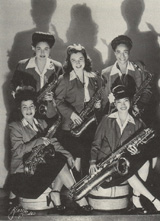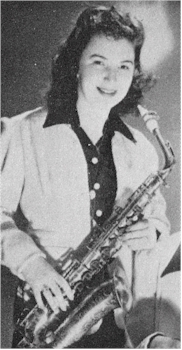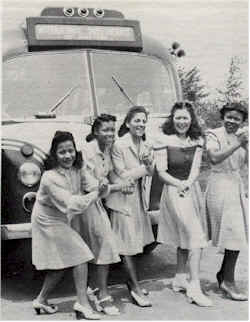A scrapbook of scenes from the Swing Era in the 30s when jazz was the most popular music in America.
The International Sweethearts of Rhythm had two strikes against them from the start. It was a racially mixed band at a time when stiff segregation laws could land you in jail for simply walking down the street with someone of a different color. And all of its members were women in an era when only men were taken seriously as jazz artists. Nonetheless, the International Sweethearts of Rhythm broke attendance records on concert tours, made it to the top of the Down Beat poll, and were pitted against jazz orchestras led by male stars Fletcher Henderson and Earl Hines in Battle of the Bands concerts.
Former alto sax player with the Sweethearts, Roz Cron, was 78 years old and living in L.A. when Riverwalk Jazz host David Holt interviewed her in 2003. He asked her what it was like the first night on the bandstand playing with the International Sweethearts of Rhythm.
ROSALINE CRON: I was so thrilled when I heard the beat, when I heard what a strong rhythm section they had. They had this wonderful strength behind them. And the brass section blew me away. So I knew I was going to be a very happy camper.
DAVID HOLT: One of the really interesting parts of this story is that you were a white girl from Boston, and you were traveling with an all-girl black band throughout the south in 1944. Now, that must have created some problems for you. Living up north in Boston, were you even aware that there was so much racial prejudice?
CRON: I was not aware of it at all. When we were traveling down south from Connecticut and doing one-niters, Mrs. Jones mentioned something about Jim Crow. I assumed it was some man I was going to meet below the Mason Dixon Line, somewhere in the South, so I was kind of looking forward to meeting somebody new. And they talked quite a bit about Jim Crow but never explained that it was a name for segregated laws. So that was quite a shock.
HOLT: Now, it was actually illegal for you to be playing with those girls, is that right? I mean, it was actually illegal.
CRON: It was not only illegal to be playing with them, but it was illegal to fraternize in any way. And as we got deeper into the South, it was illegal to be on the sidewalk with them. A black person would have to get off the sidewalk and walk in the curb if a white person was coming down the sidewalk. It got worse and worse and worse.
HOLT: That must have been shocking to you…
CRON: Yes. It was shocking. And the first episode—we had pulled into Baltimore, and Millie Jones, one of my first friends on the band, was part American-Indian and part black—she and I decided to go window shopping in downtown Baltimore. We got on the bus and she went straight to the back. I couldn’t understand why because there were so many empty seats up front. But I followed her. We got off downtown and were looking in the store windows, then I got thirsty and said, “Come on. Let’s go into Woolworth’s and have a coke.” She didn’t want to do that. But she couldn’t explain to me why she didn’t want to do that. So I just pulled her in, and we went downstairs to their little fountain.
The waitress kept ignoring us. I was getting more and more upset with her and kept calling to her to be waited on. Finally poor Millie just had it with fear. She raced out of there and up to the sidewalk. Of course, I followed her and was real upset with her, and asked her what the story was— but she didn’t explain it.
The bus came along and we got on. And again she went to the back of the bus. We didn’t say very much the whole way back to the rooming house. When we got there, she went to her room and evidently she spoke to Mrs. Jones who came into my room and explained what the Jim Crow laws were all about. Then she gave me an ‘out’ and said that if I couldn’t somehow fit in and try to make myself as unnoticeable (as a white girl) as possible, or if I just felt that I didn’t want this kind of an experience, that she would understand and I could go home and they would find somebody else. By that time I was so in love with the band and the sound and the traveling and everything else, that I said, “Oh, no. I’m sticking with you.




